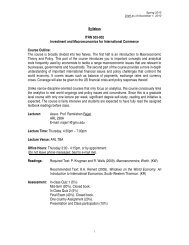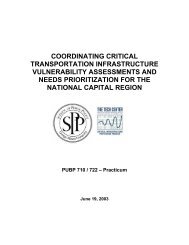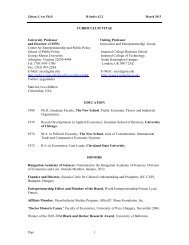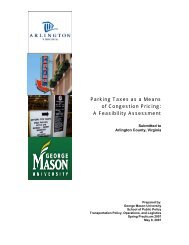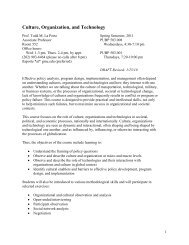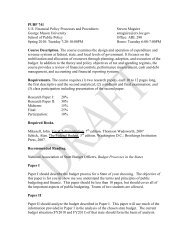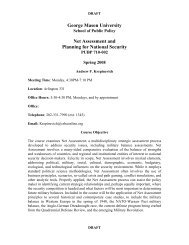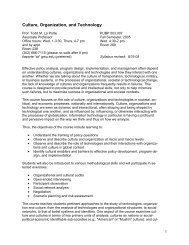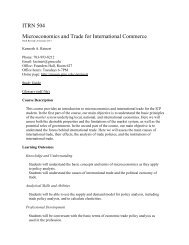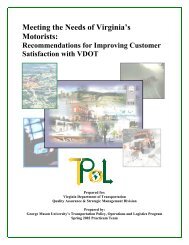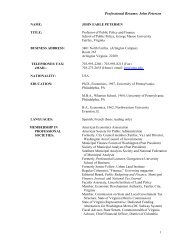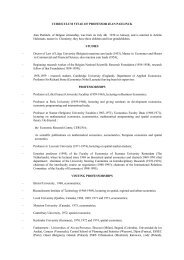George Mason University School of Public Policy Syllabus
George Mason University School of Public Policy Syllabus
George Mason University School of Public Policy Syllabus
Create successful ePaper yourself
Turn your PDF publications into a flip-book with our unique Google optimized e-Paper software.
<strong>George</strong> <strong>Mason</strong> <strong>University</strong><br />
<strong>School</strong> <strong>of</strong> <strong>Public</strong> <strong>Policy</strong><br />
<strong>Syllabus</strong><br />
PUBP 503.001 Culture, Organization, and Technology--Spring Semester 2012<br />
Instructor: Stephen Ruth, Pr<strong>of</strong>essor <strong>of</strong> <strong>Public</strong> <strong>Policy</strong><br />
Office hours: Thursday 5:30-7:00 PM and by appointment<br />
Office phone 703 993 1789 Room: Founders Hall 541<br />
Home phone: 703 536 5343 (please no calls after 8 PM)<br />
Email: ruth@gmu.edu or stever3992@aol.com<br />
Personal site http://policy-icasit.gmu.edu/bio/index.html<br />
Class Time: Thursday 7:20-10:00 PM Room TBA Founders Hall<br />
Overview<br />
Effective policy analysis and implementation <strong>of</strong>ten depend on understanding cultures,<br />
organizations and technologies and how they interact with one another. Whether<br />
considering the culture <strong>of</strong> political groups, military or business organizations, religions,<br />
the old or the young, farm or non-farm, or any other differentiation scheme, significant<br />
issues are involved. Failing to take note <strong>of</strong> cultural aspects in societies can cause even the<br />
most carefully crafted public policy plans to fail. We focus on the role <strong>of</strong> culture in the<br />
context <strong>of</strong> groups, organizations and societies together with culture-related economic and<br />
technological processes at several levels <strong>of</strong> impact: organizational, regional, national and<br />
international. The course also emphasizes the culture <strong>of</strong> teams and team approaches to<br />
learning.<br />
Learning Objectives and Outcomes Overall course objectives include greater<br />
competence in these areas:<br />
� Understanding how policy questions are framed in the context <strong>of</strong> cultural<br />
considerations<br />
� Observing and describing the manifestations <strong>of</strong> culture at micro and macro levels<br />
through blogs, news stories, analyses, reports, etc.<br />
� Reviewing the interrelated roles <strong>of</strong> technology and culture in a global context<br />
� Clarifying the role <strong>of</strong> culture as it relates to the practice <strong>of</strong> leadership in a<br />
technological age<br />
� Identifying both cultural enablers and barriers in the context <strong>of</strong> effective policy<br />
development and program implementation<br />
� Examining some to the tools used to measure cultural issues, like polling,<br />
interviewing and other assessment techniques<br />
� Learning other culture-related skills like leveraging high performance teams,<br />
recognizing and evaluating culture-related statistics, etc.<br />
� Using teaming and class participation to sharpen understanding <strong>of</strong> culture‘s role<br />
in public policy analysis<br />
1
� Taking note <strong>of</strong> popular culture interpretations, like Surowiecki‘s The Wisdom <strong>of</strong><br />
Crowds, Gladwell‘s The Tipping Point, and others<br />
� Examining closely the presentation methods used to describe cultural<br />
phenomena, like maps, bubblecharts, graphs, etc<br />
Assignments, Grades and Examinations<br />
There are three main requirements for the course: focused written assignments, a final<br />
exam (take home), and extensive participation in class discussions, presentations and<br />
projects:<br />
Four written assignments 35%<br />
Final examination (take home) 25%<br />
Weekly class discussions and individual/team projects 40%<br />
Written assignments (35%) there will be four written assignments, with appropriate<br />
diagrams or footnotes, as needed. These assignments will be given by the instructor about<br />
every three weeks. Target length: about 1000 words. See detailed requirements for<br />
submission <strong>of</strong> written work at end <strong>of</strong> this syllabus.<br />
The final examination (25%) will be a take-home test <strong>of</strong> four or five questions. It will<br />
be distributed in early November and will require about 10-12 hours <strong>of</strong> your time to be<br />
completed successfully.<br />
Class discussion and team projects (40%)<br />
Class presentation (20%) An individual or team presentation will cover a segment<br />
<strong>of</strong> the course reading assignments. The presentation should be carefully prepared<br />
and demonstrate good understanding <strong>of</strong> the material, and it should be aimed at<br />
stimulating discussion by the class. The instructor will develop a schedule for the<br />
presentations early in the course.<br />
Class participation (20%) This covers all aspects <strong>of</strong> interaction from the first class<br />
to the last, like actively joining in class discussions, emails, required weekly<br />
culture-related snippets from the media and other activities.<br />
Missed class sessions Missing class is discouraged but sometimes is necessary. More<br />
than two absences can impact the final grade. Please talk to the instructor if you must<br />
miss a class and work out with him an assignment to demonstrate that you have done the<br />
required readings for the week. Normal procedure is a 500-600 word summary <strong>of</strong><br />
assigned weekly readings for the missed class.<br />
2
Required Textbooks<br />
Lawrence Harrison and Samuel Huntington, Culture Matters-How Values Shape Human<br />
Progress (CM) (Basic Books, 2000), paperback<br />
Edgar Schein, Organizational Culture and Leadership, 4 th edition (OCL) (Jossey-Bass,<br />
2004), paperback<br />
U.S. Government Accounting Office, Ethnographic Studies Can Inform Agencies<br />
Actions, GAO-03-455, March 2003 (Will be provided in class) (ES)<br />
Jared Diamond, Guns, Germs and Steel—The Fates <strong>of</strong> Human Societies, (GG) (Norton,<br />
1999 for paperback and 2005 for hardcover)<br />
James Surowiecki, The Wisdom <strong>of</strong> Crowds, (WOC) Anchor Books 2005, paperback<br />
United Nations, Human Development Report 2011 (HDR}-- free download<br />
World Bank, World Development Report 2012 (WDR) --free download<br />
Optional Reading<br />
Gladwell, Malcolm, The Tipping Point—How Little Things Can Make a Big Difference<br />
(Back Bay Books 2002)<br />
Murphy, Cullen, Are We Rome? (Houghton Mifflin, 2007), paperback<br />
Mann, Jim, Beijing Jeep: A Case Study <strong>of</strong> Western Business in China, (Westview Press,<br />
1997)<br />
Friedman, Thomas, The World is Flat -- A Brief History <strong>of</strong> the Twenty-first Century<br />
Release 3.0<br />
Levitt, Steven, and Steven D. Debner, Freakonomics, (Morrow, 2005)<br />
Fuller, Robert, All Rise--Somebodies, Nobodies, and the Politics <strong>of</strong> Dignity, (Berrett<br />
Kohler 2006)<br />
Read, Herbert, To Hell With Culture (Schocken Books, 1963)<br />
Gladwell, Malcolm, Outliers (Little Brown, 2009), paperback<br />
Wedel, Janine, Shadow Elite: How the World's New Power Brokers Undermine<br />
Democracy, Government, and the Free Market (Basic Books, 2010)<br />
3
***********************************************************************<br />
Jan 25 May 10<br />
Team tasks X X X X X X X XX XX<br />
First paper X X X X X<br />
Second paper X X X<br />
Third paper X XX<br />
Final exam X<br />
Class Schedule (Note: some weeks there may be an additional handout or URL added to<br />
the reading assignment)<br />
January 26th Week 1: Read CM 1 (Landes); (optional) watch short lecture ―PUBP 503<br />
– Getting Started‖ (2011) at http://www.gmutv.gmu.edu/ruthlectures.asp<br />
Lecture Topics: Definitions <strong>of</strong> culture; introduction to class texts, themes and topics;<br />
several views <strong>of</strong> culture; Daniel Moynihan‘s perspective<br />
Skills focus: Personal perspectives in describing culture; approaches to class<br />
presentations<br />
Other: Individual culture narratives; class discussion<br />
February 2 Week 2: CM 2 (Porter), CM 3 (Sachs) and CM 22 (Harrison); OCL 1-4;<br />
watch ―Researching Complicated Topics---A Cultural Perspective‖ at<br />
http://www.gmutv.gmu.edu/ruthlectures.asp<br />
Lecture Topics :Technologies that affect culture; OC concepts, levels and cases; basic<br />
elements <strong>of</strong> change; culture subdivisions; artifacts, beliefs and assumptions; formation <strong>of</strong><br />
groups; dependency theory; the ―growth puzzle‖; comparative vs. competitive advantage;<br />
clusters <strong>of</strong> productivity; latitude as a predictor<br />
Skills Focus: Habits and culture <strong>of</strong> successful researchers and analysts<br />
Cultural focus: Understanding cultural data<br />
Other: Class discussion <strong>of</strong> assigned readings and snippets<br />
February 9 Week 3: CM 4 (Grandona), CM 5 (Montaner); OCL 5-7<br />
Lecture Topics: Development-resistant cultures; behavior <strong>of</strong> elites; OC assumptions<br />
concerning external adaptation and internal integration; reality vs. truth; Weber‘s<br />
―Protestant Ethic‖; the blog culture<br />
Skills focus: Organizational and cultural observation and analysis<br />
Cultural focus: Political cultures; culture in Latin America<br />
Other: Class discussion <strong>of</strong> assigned readings and snippets; Team 1 discusses CM 4<br />
(Grandona); review class blog list<br />
February 16 Week 4: Read ES; CM 9 (Lipset/Lenz), 12 (Shweder, including especially<br />
afternotes); OCL 8-9; watch lecture ―Culture: an International and Organizational<br />
Perspective‖ or Technology, Telecommuting and Culture‖ at<br />
http://www.gmutv.gmu.edu/ruthlectures.asp<br />
4
Lecture Topics: Ethnographic studies; OC assumptions about time/space and human<br />
nature; Heclo on ―Is America a Christian nation?‖ (article will be provided)<br />
Skills focus: Open-ended interviewing; conducting ethnographic surveys<br />
Cultural focus: Religion and culture<br />
Other: Class discussion <strong>of</strong> assigned readings and snippets; Team 2 discusses CM 2<br />
(Porter), Team 3 discusses CM 5 (Montaner)<br />
February 23 Week 5:CM 6 (Etounga-Manguelle) and CM 8 (Fukuyama); OCL 10-11;<br />
skim GGS Part 1; watch TED Lecture (to be assigned)<br />
Lecture topics: Social capital; ethnographic analysis; time in cultural analysis; heredity<br />
vs. culture vs. environment; cultural typologies; uniqueness <strong>of</strong> GGS approach-Yali‘s<br />
question;<br />
Cultural focus: Family culture; African culture<br />
Skills focus: Organizational and cultural audits<br />
Other Written assignment 1 (<strong>of</strong> 4) due; Team 4 discusses CM 4 (Sachs) or CM 22<br />
(Harrison)<br />
March 1 Week 6: CM 17 (Perkins); CM 18 (Pye); and CM 19 (Wei-Ming); skim GGS<br />
Part 2; read OCL 12-13; read Watts, Duncan. ―Decentralized Intelligence: What Toyota<br />
Can Teach the 9/11 Commission about Intelligence Gathering,‖ (Available at:<br />
http://slate.msn.com/id/2104808)<br />
Lecture Topics: Linking technology to culture (and vice versa); leadership‘s role in OC;<br />
assessing traditional beliefs; creating customer-centric cultures; new group integration;<br />
role <strong>of</strong> founders/leaders<br />
Cultural focus: Asian culture<br />
Skills focus: Polling and questionnaire development (CD tutorial by Dr. Mayer and Dr<br />
Marsh); organizational and cultural audits<br />
Other: Class discussion <strong>of</strong> assigned readings and snippets; Team 5 discusses CM 17<br />
(Perkins) or CM 18 (Pye), Team 6 discusses GGS part 1-2<br />
March 8 Week 7: read CM 7 (Inglehart), CM 13 (Crosette) and CM 10 (Edgerton);<br />
Skim first half <strong>of</strong> WOC; (optional) Watch streaming lecture ―SPQR to ‗Power to the<br />
People‘--20 Centuries <strong>of</strong> Analysis‖ at http://www.gmutv.gmu.edu/ruthlectures.asp<br />
Other: Review tutorials on polling and questionnaire development (on class CD)<br />
March 15 Week 8: CM 14 (Htun); skim GGS Part 3; OCL 14; skim second half <strong>of</strong><br />
WOC<br />
Lecture Topics: Geography and culture; creating, embedding and transmitting OC; food<br />
production and culture; moral maps; collective wisdom; wisdom <strong>of</strong> crowds; cultural<br />
adaptations; culture and gender (part 1)<br />
Skills focus: Social network analysis<br />
Cultural focus: Culture <strong>of</strong> Europe; governmental and institutional cultures<br />
Other: Class discussion <strong>of</strong> assigned readings and snippets; Team 7 discusses CM 7<br />
(Inglehart); continue review <strong>of</strong> CD tutorials on polling and questionnaire development;<br />
written Assignment 2 (<strong>of</strong> 4) is due<br />
5
March 22 Week 9: CM 22 (Harrison), CM 15 (Patterson); read OCL 15; skim GGS<br />
parts 4-5<br />
Lecture Topics: Organizational ―mid-life‖; cultural and technological issues among<br />
American minorities; disaggregating culture; the digital divide; cyberteam approaches;<br />
contagiousness, big effects and gradual change in organizations; leadership and cultural<br />
change<br />
Cultural focus: Business culture<br />
Other: Class discussion <strong>of</strong> assigned readings, Team 8 discusses topic to be selected;<br />
Class discussion <strong>of</strong> assigned readings and snippets<br />
March 29 Week 10: Skim GGS 4-5; CM 20 (Fairbanks); CM 12 (Schweder); Watch<br />
streaming lecture at http://www.gmutv.gmu.edu/ruthlectures.asp―Overview <strong>of</strong><br />
Knowledge Management‖; OCL 16<br />
Lecture Topics: Managed cultural change; knowledge management as a cultural change<br />
agent; the culture <strong>of</strong> education; constructive vs. destructive communications<br />
environments<br />
Cultural focus: Education<br />
Skills focus: Risk assessment and scenario planning in a cultural context<br />
Other: Class discussion <strong>of</strong> assigned readings, Team 9 discusses topic to be selected;<br />
Team 10 discusses topic to be selected; final examination (take home) distributed; written<br />
assignment 3 (<strong>of</strong> 4) due<br />
April 5 Week 11: OCL 17; GGS Epilogue; skim WDR;<br />
Lecture Topics: Social networks; GGS and culture; cultural statistics in context,<br />
knowledge cultures; mavens, connectors and salesmen (Gladwell); managed cultural<br />
change; culture and gender (part 2)<br />
Cultural focus: The link between technology and culture<br />
Skills focus: Changing culture in high performance organizations<br />
Other: Class discussion <strong>of</strong> assigned readings, Team 10 discusses CM 20 (Fairbanks) or<br />
CM 12 (Schweder) or topic to be selected; written assignment 3 (<strong>of</strong> 4) due; final exam<br />
distributed<br />
**April 12 Week 12 : OCL 17; GGS Epilogue; skim WDR;<br />
Lecture Topics: Social networks; GGS and culture; cultural statistics in context,<br />
knowledge cultures; mavens, connectors and salesmen (Gladwell); managed cultural<br />
change; culture and gender (part 2)<br />
Cultural focus: The link between technology and culture<br />
Skills focus: Changing culture in high performance organizations<br />
Other: Class discussion <strong>of</strong> assigned readings, Team 10 discusses CM 20 (Fairbanks) or<br />
CM 12 (Schweder) or topic to be selected; written assignment 3 (<strong>of</strong> 4) due; final exam<br />
distributed<br />
April 26 Week 14: CM 11 (Weisner); OCL 18<br />
6
Lecture Topics: Failed states and culture; social networks; OC case studies; leveraging<br />
KM and virtual teams; teamwork in public policy negotiation; internalizing high-level<br />
goals;<br />
Skills focus: Performing an on-site OC intervention<br />
Other: Class discussion <strong>of</strong> assigned readings and snippets; written assignment 4 (<strong>of</strong> 4)<br />
due; Team 11 discusses topic to be selected<br />
May 3 Week 15 (last class meeting): OCL 19 and 21<br />
Lecture Topics: Teamwork models—Drexler-Sibbet, etc; learning cultures and learning<br />
leaders; multicultural groups; course review and synthesis<br />
Other: Class discussion <strong>of</strong> assigned readings and snippets<br />
December 10 Final examination (take home) due<br />
** Indicates no class session. On-line streaming video lectures and other autodidact<br />
materials are assigned. See discussion below on autodidact approaches<br />
***********************************************************************<br />
Grading: The grade <strong>of</strong> A or A minus is reserved for a very high level <strong>of</strong> achievement in<br />
analysis and writing; B and B plus grades indicate good mastery <strong>of</strong> the material and<br />
excellent mastery <strong>of</strong> assigned writing. Grades <strong>of</strong> B minus and below indicate incomplete<br />
achievement <strong>of</strong> an assignment‘s requirements. On a 100% scale, A is equal to 95%, B<br />
85%, C 75%<br />
Sept 1 Oct Nov Dec 15<br />
Team tasks X X X X X X X XX XX XX X X X<br />
First paper X X X X X<br />
Second<br />
X X X<br />
paper<br />
Third paper X XX<br />
Fourth paper X XX X<br />
Final exam X XXX X<br />
Autodidact Approaches in this Course--Exchanging some class time for technology<br />
and other interventions This course takes advantage <strong>of</strong> well-documented findings about<br />
university teaching, particularly the technique called ―blended learning‖. Many students,<br />
especially those who have full-time jobs, appear to be quite willing to exchange a portion<br />
<strong>of</strong> on-campus class hours for assignments that can be completed in other locations, like<br />
home or <strong>of</strong>fice. Studies indicate that it is possible for a student to learn as much or more<br />
in many courses if the traditional 45-48 hours per semester <strong>of</strong> "face time" in class with an<br />
instructor (contact hours) are partially replaced with specially designed assignments that<br />
do not require face-to-face meeting. This work can be more independent, discoveryoriented<br />
and difficult, but, if planned properly, can replace some contact hours. By<br />
experimenting with this concept in close to a dozen courses, we have found that many<br />
students enthusiastically support the approach--as long as close contact with the<br />
instructor and class colleagues is maintained throughout and the content is challenging<br />
7
and in the mainstream <strong>of</strong> the subject involved. In this course there will be two normal<br />
class meetings that will use this autodidact intervention. They are designated by double<br />
asterisks on the schedule above.<br />
Ethical Conduct--GMU Honor Code GMU shares in the tradition <strong>of</strong> an honor system<br />
that has existed in Virginia colleges since 1842. The Honor Code is an integral part <strong>of</strong><br />
university life. Students are responsible for understanding the provisions <strong>of</strong> the code. In<br />
the spirit <strong>of</strong> the code, a student's word is a declaration <strong>of</strong> good faith acceptable as truth in<br />
all academic matters. Therefore, attempted cheating, plagiarism, lying, and stealing <strong>of</strong><br />
academic work and related work constitute Honor Code violations. All work must be<br />
your own. Inappropriate use <strong>of</strong> the work <strong>of</strong> others without attribution is plagiarism and a<br />
<strong>George</strong> <strong>Mason</strong> <strong>University</strong> Honor Code violation punishable by expulsion from the<br />
<strong>University</strong>. All students should familiarize themselves with this honor code provision<br />
(http://www.gmu.edu/facstaff/handbook/aD.html). To guard against plagiarism and to<br />
treat students equitably, written work may be checked against existing published<br />
materials or digital data bases available through various plagiarism detection services.<br />
Accordingly materials submitted to all courses must be available in electronic format.<br />
SPP <strong>Policy</strong> on Plagiarism--The pr<strong>of</strong>ession <strong>of</strong> scholarship and the intellectual life <strong>of</strong> a<br />
university as well as the field <strong>of</strong> public policy inquiry depend fundamentally on a<br />
foundation <strong>of</strong> trust. Thus any act <strong>of</strong> plagiarism strikes at the heart <strong>of</strong> the meaning <strong>of</strong> the<br />
university and the purpose <strong>of</strong> the <strong>School</strong> <strong>of</strong> <strong>Public</strong> <strong>Policy</strong>. It constitutes a serious breach<br />
<strong>of</strong> pr<strong>of</strong>essional ethics and it is unacceptable. Plagiarism is the use <strong>of</strong> another‘s words or<br />
ideas presented as one‘s own. It includes, among other things, the use <strong>of</strong> specific words,<br />
ideas, or frameworks that are the product <strong>of</strong> another‘s work. Honesty and thoroughness<br />
in citing sources is essential to pr<strong>of</strong>essional accountability and personal responsibility.<br />
Appropriate citation is necessary so that arguments, evidence, and claims can be critically<br />
examined.<br />
Plagiarism is wrong because <strong>of</strong> the injustice it does to the person whose ideas are stolen.<br />
But it is also wrong because it constitutes lying to one‘s pr<strong>of</strong>essional colleagues. From a<br />
prudential perspective, it is shortsighted and self-defeating, and it can ruin a pr<strong>of</strong>essional<br />
career.<br />
The faculty <strong>of</strong> the <strong>School</strong> <strong>of</strong> <strong>Public</strong> <strong>Policy</strong> takes plagiarism seriously and has adopted a<br />
zero tolerance policy. Any plagiarized assignment will receive an automatic grade <strong>of</strong><br />
―F.‖ This may lead to failure for the course, resulting in dismissal from the <strong>University</strong>.<br />
This dismissal will be noted on the student‘s transcript. For foreign students who are on<br />
a university-sponsored visa (eg. F-1, J-1 or J-2), dismissal also results in the revocation <strong>of</strong><br />
their visa.<br />
To help enforce the SPP policy on plagiarism, all written work submitted in partial<br />
fulfillment <strong>of</strong> course or degree requirements must be available in electronic form so that<br />
it can be compared with electronic databases, as well as submitted to commercial services<br />
to which the <strong>School</strong> subscribes. Faculty may at any time submit student‘s work without<br />
prior permission from the student. Individual instructors may require that written work be<br />
8
submitted in electronic as well as printed form. The SPP policy on plagiarism is<br />
supplementary to the <strong>George</strong> <strong>Mason</strong> <strong>University</strong> Honor Code; it is not intended to replace<br />
it or substitute for it. (http://www.gmu.edu/facstaff/hand book/aD.html). See also the<br />
university‘s academic policy web site at http://universitypolicy.gmu.edu/.<br />
Disability Accommodation If you are a student with a disability and you need academic<br />
accommodations, please see instructor and contact the Disability Resource Center (DRC)<br />
at 703 993-2474. All academic accommodations must be arranged through the DRC.<br />
"New Voices in <strong>Public</strong> <strong>Policy</strong>: Instructor will consider nominating the very best papers<br />
in this course for publication in New Voices in <strong>Public</strong> <strong>Policy</strong>. New Voices is a student-<br />
and faculty-reviewed journal that shares SPP's finest student work with the rest <strong>of</strong> the<br />
world<br />
Importance <strong>of</strong> Good Writing Skills. Students in this course will be expected to do<br />
several short writing assignments, a normal requirement in graduate courses in public<br />
policy. From the outset, the highest standard <strong>of</strong> writing will be expected. Here are some<br />
<strong>of</strong> the criteria that will be used to measure submitted written work:<br />
� Quality <strong>of</strong> Content: analytical clarity/persuasiveness; objectivity; quality <strong>of</strong> source<br />
material; use <strong>of</strong> evidence/methodology.<br />
� Tone, Structure and Organization: focused introduction, thesis, conclusion; use <strong>of</strong><br />
transitions, headings and other cohering strategies; logical paragraphing in<br />
support <strong>of</strong> main points.<br />
� Mechanics: Correct citation and documentation; required elements like title page,<br />
works cited, page numbering; grammar, spelling, punctuation, etc. All work<br />
should be submitted in MS Word Times New Roman 12 or 14 pt. format single or<br />
double spaced, depending on the style guide selected<br />
� Structure: The normal breaks between paragraphs will be observed, using any<br />
style guide you choose. The Chicago Manual <strong>of</strong> Style is available on line at<br />
http://furbo.gmu.edu/dbwiz/ref Another popular choice is Diana Hacker, A<br />
Pocket Manual <strong>of</strong> Style, (New York, St. Martin‘s Press, latest edition). Work<br />
should be neatly arranged with clear demarcation <strong>of</strong> sub- units. (The four criteria<br />
above were developed by Dr. Jonathan Gifford.)<br />
� Grammar: Impeccable word usage and grammar will be expected in all submitted<br />
work. Students may wish to show early work to someone else--a friend or<br />
colleague--for a review <strong>of</strong> style, grammar and other details. Papers with more than<br />
a very small number <strong>of</strong> errors in grammar and word usage will be returned.<br />
� Method <strong>of</strong> submission: All papers will be submitted to the instructor by email as<br />
MS Word attachments using a clear description in the subject line <strong>of</strong> the message.<br />
For example: Julia Jones, Assignment 3.<br />
9



